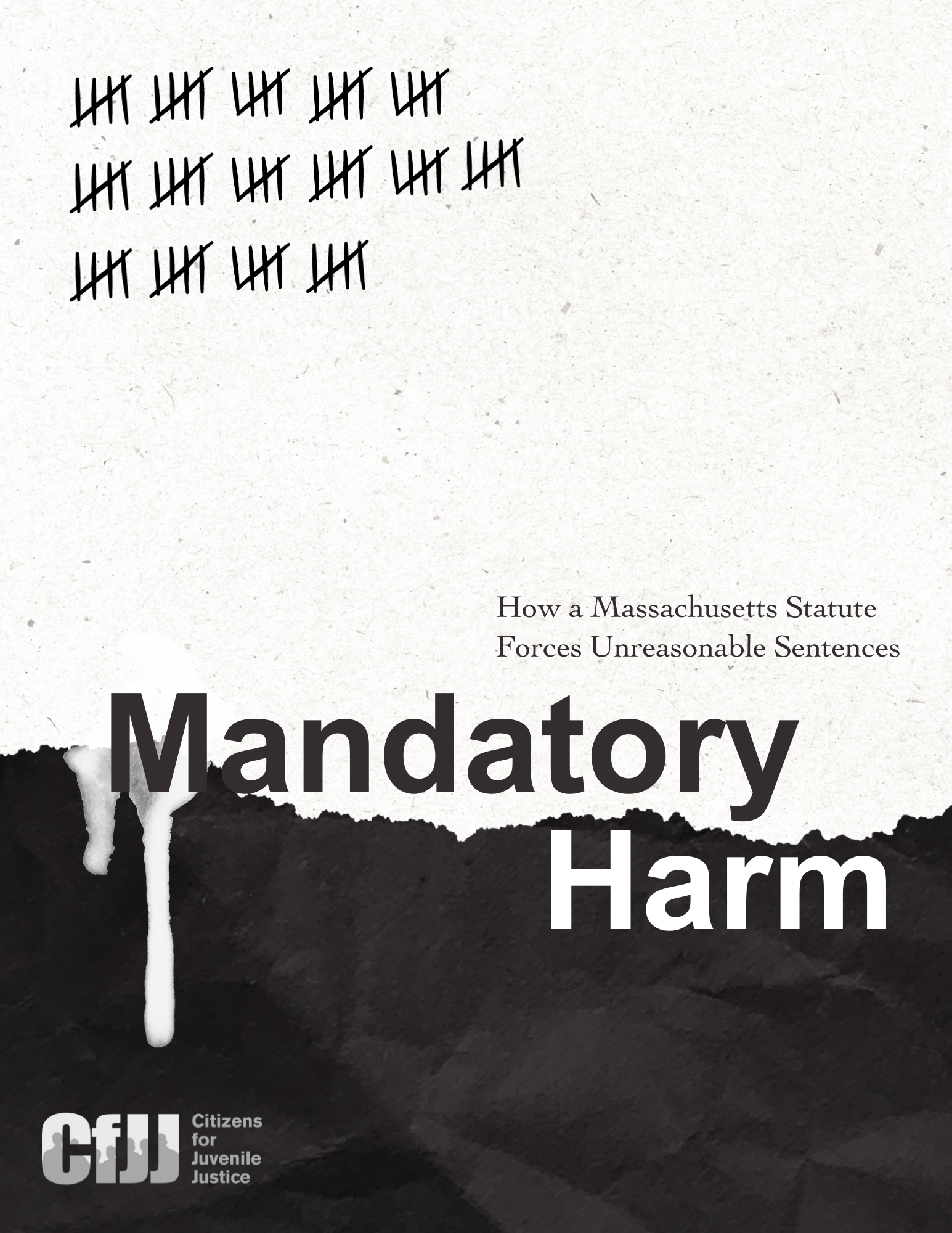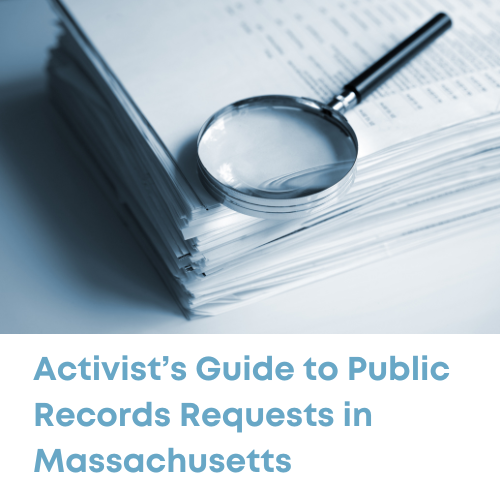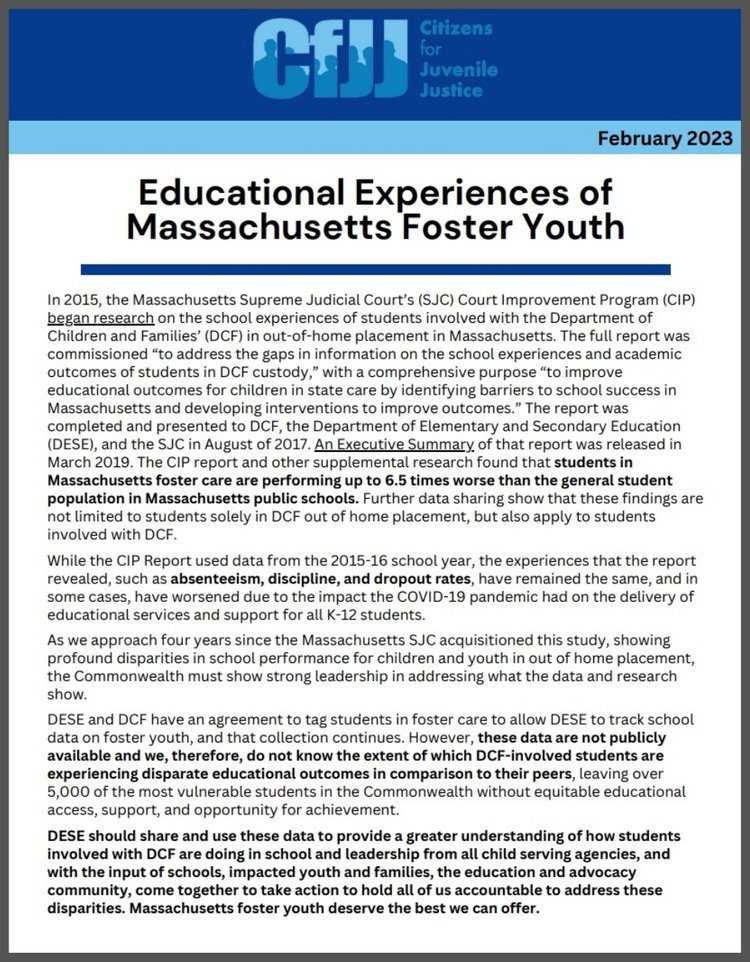CfJJ Publications
CfJJ regularly publishes reports on important juvenile justice issues affecting Massachusetts. Featuring relevant state data, national research on best practices, and stories from impacted young people and their families, these reports provide critical information to the public and policy decision-makers about the best ways to improve our state systems for children and young people.
Arrested Futures Revisited: Springfield. THE ONGOING IMPACT OF THE SCHOOL-TO-PRISON PIPELINE
This report considers how Springfield’s current school and policing policies contribute to the school-to-prison pipeline. It analyzes school discipline and school arrest data as well as input from students on school climate. Finally, the report analyzes the Memorandum of Understanding (MoU) between the school and police department, highlighting ongoing gaps between the city's MoU and the safeguards outlined by the state’s model MoU.
Mandatory Harm: How a Massachusetts Statute Forces Unreasonable Sentences
This report examines the impact of one Massachusetts law (MGL Chapter 269 Sec 10G) that places lengthy mandatory minimum sentences for gun possession for people with prior records (including juvenile records). It acts as a sentencing enhancement and prosecutorial cudgel, and its use show significant racial disparities: Seventy-five percent of cases charged under the law are against Black and Latine defendants.
Activist’s Guide to Public Record Requests in Massachusetts
This guide created by students at Northeastern University School of Law and CfJJ provides step by step information for a general audience on how to navigate the public record request process. The Activist’s Guide to Public Record Requests in Massachusetts gives readers everything they need to start submitting their own information requests, handling appeals, and advocating for legislative, policy, or practice change in their communities.
Justice by geography: Differential Treatment of Youth by Locality at Juvenile Legal System Decision Points
“Justice by geography” is defined as the differential application of justice policies and practices across a state or region. This issue brief establishes that this phenomenon is real in Massachusetts and identifies decision points where it presents within our juvenile legal system. “Justice by Geography” provides a county-level reflection on data, with the aim of spurring action from system actors at the state and local level to ensure that all youth are treated fairly in the system, regardless of where in the Commonwealth they live.
Educational Experiences of Massachusetts Foster Youth
This issue brief shares in-depth data and information on the disparate outcomes in attendance, school mobility, dropout rates, discipline, grade retention, performance on state assessments, and graduation rates. Findings show that students in Massachusetts foster care system are performing up to 6.5 times worse than the general student population in Massachusetts public schools.
Metal Detectors: “SECURITY THEATER,” NOT SAFER SCHOOLS
This issue brief lays out the concerns around the use of metal detectors in schools, which includes: (1) research establishing that their actual impact on safety is unproven, and their impact on perception of safety can be negative; (2) key stakeholders have found their use overly time-consuming, expensive, and an overall disruption to the learning environment; (3) use of metal detectors carry negative social, psychological and developmental impacts on students; (4) there are racial disparities and discriminatory practices associated with the use of metal detectors; and (5) proper implementation of metal detectors creates significant costs to districts.
FAILING OUR KIDS: MEASURES OF THE BROKEN CHILD WELFARE SYSTEM IN MASSACHUSETTS
This review, from Friends of Children and Citizens for Juvenile Justice, first compares DCF to U.S. averages (all states) and specifically to other states (the wealthiest, the poorest, and the most populated, as well as other New England states). Additionally, we identify DCF performance before implementation of the 2015 child welfare reforms of Governor Charlie Baker’s administration and several years later, in FY2019 and FY2020, to look at the impact of the reforms.
School’s Out: Massachusetts Youth in Adult Correctional Systems Denied Education
Educating incarcerated youth benefits society in multiple ways and is not only legally mandated but is the right thing to do from a moral, fiscal, and community safety perspective. This report provides a comparative overview of educational approaches and outcomes in the adult and juvenile systems for incarcerated young people aged 18–21 in Massachusetts, with a focus on special education.
Fiction: Media Sensationalism and the False Narrative of a Youth Crime Wave in Massachusetts
News media, often steered by law enforcement public relations offices, prosecutors, and some politicians, are driving a false narrative in Massachusetts and nationwide that youth crime is on the rise. Indeed, this inaccurate narrative reflects how Americans view crime in the nation as a whole. In stark contrast to the police/media narrative, Fiction presents publicly available data to show that youth crime has declined significantly over the last 15 years in Massachusetts and has continued to decline over the last three years. Since the early 2000's, juvenile arrests, applications for complaint, and gun-carrying among Massachusetts youth has decreased steadily.
RESPECT YOUTH STORIES
Citizens for Juvenile Justice, in collaboration with the National Juvenile Justice Network, partnered to create a toolkit titled, "Respect Youth Stories: A Toolkit for Advocates to Ethically Engage in Youth Justice Storytelling", to provide insight from young people on ways that advocates can ethically invite them to share their stories.
How much does policing cost the City of Boston? While the stated Boston Police Department (BPD) budget was just over $404 million in FY2021, this estimate does not incorporate hidden costs to the city, including pension pay-ins and health insurance costs. After incorporating these hidden costs, the actual cost of operating BPD was over $572 million.
The Boston Police Department (BPD) has been tasked with responding to a wide variety of incidents and situations, many of which fall beyond core law enforcement responsibilities. Too Blue analyzes publicly available data from the City of Boston, with the aim of answering two questions: (1) What types of incidents do the Boston Police Department respond to? and (2) Which of these incident types could be handled more efficiently and effectively by non-police alternatives to meet community needs?
The New Bedford Police Department reports incidents involving young people of color at disproportionate rates that are shocking in a white majority city. Additionally, there are patterns of over-policing lower-income neighborhoods, both formally and informally, as police officers are encouraged to live in public housing by rents that are discounted far below that of other residents and communities of color bearing the brunt of frequent stops and interrogations by the NBPD.
Stationing police in schools does not protect students from violence, but it causes significant harm to students, especially students of color. Fail distills decades of research on the outcomes of placing police in schools and makes specific recommendations to end policing in schools and support more effective means of promoting safety.
Seizing An Early Opportunity analyzes the findings of a survey of 95 police departments in Massachusetts regarding their formal and informal diversion practices. While diversion offers police departments an opportunity to reduce the negative impacts of justice system involvement on young people, practices are applied inconsistently and unequally across the state. This report examines examples of successful diversion programs and makes recommendations for improvement at the local and state level.
Shutting Down the Trauma to Prison Pipeline analyzes the recent trends related to the increasing number of child welfare cases in Massachusetts, particularly involving Latinx youth. The report also examines at the impact of unaddressed trauma on young people's behavior and the need for more accessible, culturally competent behavioral and mental health care.
Visioning an Improved Youth Justice System in Boston
Visioning an Improved Youth Justice System analyzes community-generated recommendations on alternatives to young people's arrest and court involvement. The white paper outlines seven themes emerging from focus groups in Boston and a framework for a pre-arraingment diversion blueprint.
Less Crime for Less Money examines the current state of Massachusetts' pre-arraignment diversion options, the best practices as identified by the best available evidence, and our recommendations to enhance public safety and improve youth outcomes all while saving taxpayers dollars.
Missed Opportunities examines children who "cross over" from the child welfare system into the juvenile justice system. This review found that children within child welfare system who became juvenile justice-involved had significantly different experiences from those in the child welfare system who did not. These findings present opportunities to intervene, and incorporate different policies and programs that can prevent these children’s juvenile justice involvement
Unlocking Potential
Unlocking Potential, a CfJJ report released in March 2014, highlights why detention is harmful to kids, who we detain, and which alternatives to detention are working well in Massachusetts. It also calls attention to work that still needs to be done, including the need to expand models already being developed at the local level to reduce juvenile incarceration around the Commonwealth
Data∙Points: Current Trends
CfJJ continues its Data∙Points series with the latest release, Current Trends, which highlights multi-year downward trends at several key points in the Massachusetts juvenile justice system: arrest, court processing, pre-trial detention, and post-adjudication commitment to the Department of Youth Services (DYS). This report also provides an overview of the age, race and ethnicity, and gender of youth in our system, offering a glimpse of the thousands of teens who travel through our juvenile court system each year.
Data∙Points: Who does the Massachusetts juvenile justice system serve?
The 2012 Data∙Points publication, Who does the Massachusetts juvenile justice system serve?, provides a snapshot of the youth who come into contact with this system. The Data∙Points series compiles the most current data from the juvenile justice in Massachusetts to support an informed dialogue among policymakers and the public about the state of our juvenile justice system - who it serves, where it is functioning best, and where it needs to improve.
Arrested Futures: The Criminalization of School Discipline in Massachusetts’s Three Largest School Districts
Arrested Futures, a report by Citizens for Juvenile Justice in partnership with the American Civil Liberties Union, examines school-based arrests at Massachusetts’ three largest school districts – Boston, Springfield and Worcester – and evaluates which students are being arrested and why. Report authors reviewed years of arrest data from these districts, including both numerical data and written reports from arresting officers, to determine the number, rate, and nature of the behavior that lead to the arrests. These findings are an important addition to existing research examining the “school-to-prison pipeline,” showing that students are being frequently arrested for minor, disruptive behavior that could be better addressed by school administrators.
Data∙Points
CfJJ's December 2011 publication, Data∙Points, compiles the most current data from police, courts, probation, and the Department of Youth Services (DYS) to paint a broad picture of how Massachusetts is serving some of its most vulnerable children and youth: those who are involved in our juvenile justice system. CfJJ hopes the report is the first step in starting an informed dialogue about how best to improve our system, so that it is both fair and effective.
Minor Transgressions, Major Consequences: A picture of 17-year-olds in the Massachusetts criminal justice system
Minor Trangressions, Major Consequences examines Massachusetts' policy of sending all 17-year-olds accused of a crime to the adult criminal justice system, a practice that makes kids more likely to reoffend and threatens their safety.The report points to numerous national studies that find youth sent to the adult system are more likely to reoffend and to escalate to more serious crimes than those in the juvenile system. Research also shows that minors held in adult facilities are at high risk of committing suicide and of being physically or sexually assaulted. In the report, Massachusetts teens recount being strip searched in adult facilities and learning to look up to adults imprisoned for serious crimes, including murder.

























